Crisis in Haiti
As civil unrest and protests escalate, poverty deepens. NPH Haiti, however, strives to support the nation’s most vulnerable citizens.
Go to latest news ->
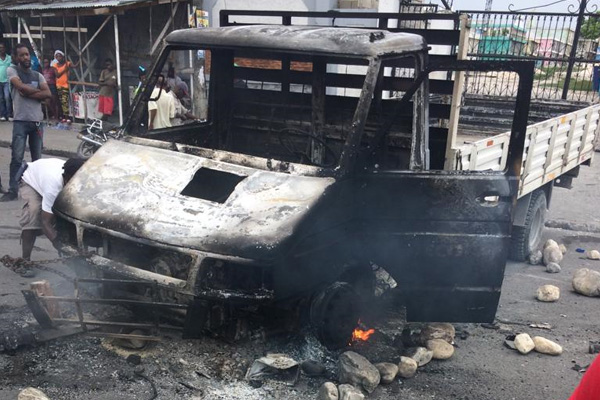 Statement from Reinhart Köhler, President of NPH International
Statement from Reinhart Köhler, President of NPH International
September 29, 2019
Dear Friends of the Extended NPH Family,
I am writing you today to share with you our deep concern for our NPH Family in Haiti and for the people of Haiti in general. Over the last year and a half, living conditions in Haiti have deteriorated resulting in prolonged and serious social unrest, protests, road blocks, and generalized violence. Yet, the international media has paid scant attention to a dire situation that is costing hundreds of lives and putting in jeopardy an entire nation.
This letter is not to explain the reasons for the protests, though I venture to say that the dire circumstances in which the Haitian people live would create the same protests in any other country. This message is to highlight the consequences of the upheaval especially for our children, staff, and volunteers.
The road blocks create a situation that results in shortages of fuel, food, and other essential supplies. At Kay St. Helene, we have food for seven more days. The hope is to be able to resupply the home when things are calmer and we can get through to the home; however, it is very difficult even to find food to purchase. And even if we find food and try to bring it to our children’s home there is always the possibility that with so many suffering hunger, a group will stop the vehicle and take the food.
Usually, we supply our home with water using water trucks. The trucks now cannot make it to the home. So our children walk three miles to a fountain to fetch water in gallon jugs and buckets and haul the water walking back to the home again three miles. The water needs to be treated with purification tablets which are now in short supply.
The only vehicles that can make it through the road blocks (but not always) are ambulances of which we own two. We use them to carry out the most urgent logistics moving essential staff to and from the hospital, and we do hope to acquire an additional ambulance to respond to the many situations requiring urgent assistance. The banks have not opened for three days and we do not know when we might have access to funds. So basically it is extremely difficult to find essential supplies; and the few we find are sold at a premium. Yet, we do not have enough cash to purchase the supplies because the banks are closed.
There are many other dreadful situations such as the inability to attend to medical emergencies, the piling up of unsanitary garbage, dead bodies in the morgue without space for additional bodies, no schooling, and loss of income due to inoperability of income producing programs. This situation holds true for every individual living in Haiti and any organization trying to fulfill its mission. Many of the Hermanos and Hermanas Mayores of the NPFS Family have approached us for help to support them and their families for all the same reasons.
Finally, the safety of everyone is a top priority, yet many of our staff expose themselves to danger because otherwise the harmful consequences to the children of NPFS and the patients of St. Damien would be immeasurable. We urgently need to increase the security services to our facilities to protect the children, patients, and staff as the desperation among the population grows with every day that the chaos continues.
We do what we can and yes, we need your prayers and help to respond to these extraordinary circumstances. On the day I am writing this message, the Catholic Church celebrates the three Archangels Michael, Rafael and Gabriel. According to the book of Revelation, the Archangel Michael leads God’s armies to final victory over the forces of evil. We need such special help to defeat the forces of evil that have created such a desperate situation for the people of Haiti. We need to continue our mission every day a step at a time because as Fr. Rick says: “We all must hold ourselves to another very high standard: that we respond to the very worst of what we see and live through, with the very best of what is within us. Only this stops the deadly spread of hatred and revenge. We all need to do this, before it is too late.”
Sincerely,
Reinhart Köhler
President
NPH International
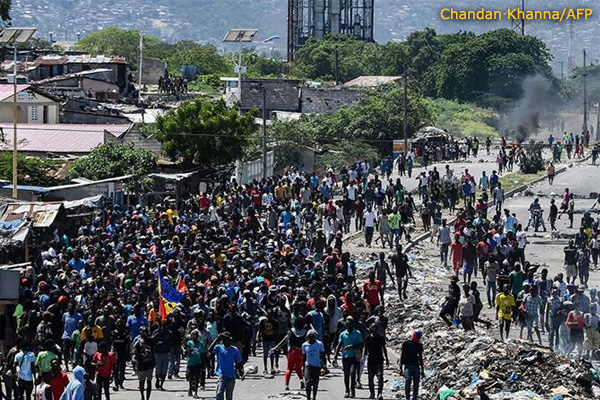 Reported by NPH staff
Reported by NPH staff
October 23, 2019 – Haiti
First, a brief history lesson. Haiti is located in the Greater Antilles, occupying one-third of the western area of the island of Hispaniola which it shares with the Dominican Republic. Port-au-Prince is its capital and Massif de La Selle is its highest mountain, about 2,680 meters above sea level.
After the defeat of Napoleon Bonaparte’s army during the Battle of Vertières in 1803, the Republic of Haiti was born. It became the world’s first black republic in 1804. It was also the only independent French-speaking country in the Caribbean territory. From about 1950 to 1970 Haiti was a popular Caribbean destination. Its modern-day history of political unrest can be traced back to the fall of the Duvaliers (François Duvalier, known as “Papa Doc,” and his son Jean-Claude Duvalier, known as “Baby Doc”). In the period following, Haiti, once known as “the Pearl of the Antilles,” hoped for a democratic renaissance.
At that time, Haiti had a productive economy, buoyed by its diverse culture and natural beauty. In more stable times, it has a robust agricultural base. More than half of the world’s vetiver oil (an essential oil used in high-end perfumes) comes from Haiti. Bananas, cocoa, and mangoes are the most exported crops. Haiti has also looked to expand into higher-end manufacturing, producing Android-based tablets, electrical current sensors, and transformers.
Since the time of the Duvaliers, Haiti has changed a great deal on political, economic, and social fronts. There has been little peace in our society, with government, socio-economic, and political figures doing little to improve the lives of Haitian people. Today the inflation rate has risen by 18%. A large majority of the population lives in extreme poverty, while the middle class grows smaller and smaller.
Today’s protesters are young people—10, 18, 20, 30 years old—the majority of whom should be in school preparing for their futures. But today they are the ones who hunger for change, who want a better way of life. They and others are besieged by limited access to quality education, potable water, electricity, and other necessities, as well as the nagging threat of natural disasters like the horrendous 2010 earthquake.
Since early February, the country has seen large crowds of protesters that grow bigger by the day. Roadblocks are frequent and unpredictable. Shops are closed. Schools are shut down and the hospitals do their best to stretch staff and dwindling supplies from one emergency to another.
Every Haitian is hidden away in their home. The hunger and misery that affect us all only grows in the face of constant turbulence in the streets. The gasoline shortage has paralyzed a wide swath of activities for weeks throughout the country.
NPH is not excluded from the effects of this current crisis. Our work often puts us on the front line serving the poorest and most vulnerable populations in the country. In spite of these challenges, we continue as best we can serving those in need.
The protesters demand that President Jovenel Moïse leave office. The deaths of more than 20 people has been attributed to the recent violence, but there are other victims. Those who cannot travel on roads choked with burning tire blockades and menacing protesters do not receive important medical care—mothers giving birth, heart patients, special needs therapy patients.
For St. Damien Pediatric Hospital, our doctors, nurses, and other critical staff struggle to travel to work each day. Employees who make the journey risk their lives to help save the lives of others. The escalating violence is impacting NPH Haiti’s ability to access needed day-to-day living essentials. No citizen of Haiti has been spared. We all suffer individually and as a nation.
Every Friday, Haitian artists take to the streets to demand change because what we are living now is too much to bear. Today’s younger generations feel stranded by those in power. My nation longs for a taste of peace, joy in the streets in place of unrest, but we do not have much hope of experiencing either. I pray change will come to Haiti soon and that peace will follow.
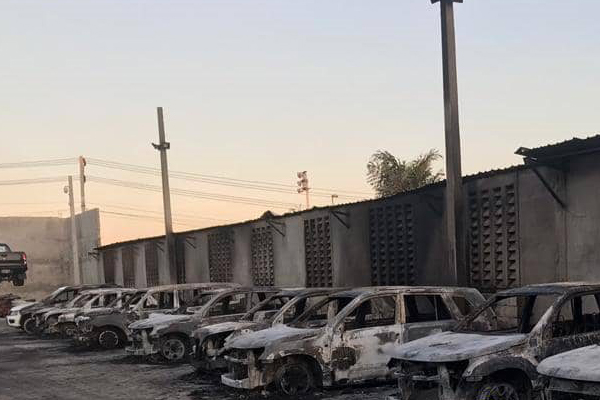 Reported by Dr. Jacqueline Gautier, NPH Haiti National Director for St. Damien Pediatric Hospital and St. Kay Germaine
Reported by Dr. Jacqueline Gautier, NPH Haiti National Director for St. Damien Pediatric Hospital and St. Kay Germaine
November 6, 2019 – Haiti
For seven weeks the country has been nearly paralyzed. All commercial enterprises—banks, shops, grocery stores, and also schools—are closed. Grocery stores and banks open for four hours a day on calm days.
It is impossible to pass through the roadblocks. Demonstrators become violent. Many times there are clashes between civilians and the police who are trying to suppress the demonstrations. Demonstrations end too often with looting and vandalizing property. People are asking for the president to resign, but Jovenel Moïse remains firm and insists on completing the final two years of his term.
How are the children and patients coping, physically and psychologically?
St. Damien’s patients continue to receive care; however, the population of children who come for basic ambulatory care has diminished considerably, down to one-third of the previous volume. The maternity unit, however, is receiving an excess of patients for labor and deliveries, a 30% increase in patient volume. Most other healthcare institutions are not functioning. These days St. Damien turns away more women than we accept for deliveries and C-sections. At times an ambulance may visit three healthcare facilities before the women who were not admitted at St Damien can find another hospital to deliver their babies. The number of malnutrition cases remains high; these parents brave violence in the streets to bring their children to us.
How have the staff coped?
Our staff comes to work. The local administration, however, is very busy managing public transportation and special schedules. A few staff members stay at the nearest guest house run by The St. Luke Foundation for Haiti. Everyone is affected by the situation in one way or another. A few people have been accosted coming to work or have witnessed difficult situations in the streets. They do their best to remain professional, but they are very stressed.
The emergency room, ICU, and maternity unit run on 24-hour shifts; by now, the staff is tired. Parents are anxious and worried seeing their children stay home, even while some schools provide homework online.
Two longtime employees (more than 20 years) resigned: the director of nursing and the employee responsible for sterilization. One physician asked for a three-month leave of absence and will leave the country soon.
Which services have been seriously affected?
The services that are seriously affected are the maternity ward, ICU, and the emergency room. The impact is extra work. The surgical department mostly does emergency cases so it is less busy. Unfortunately, they can’t schedule elective procedures so the situation negatively affects the training of fellows in pediatric surgery.
In summary, life is much disrupted for everyone in Haiti and, what’s worse, no one can predict when the situation will be back to normal. We fear it could get worse before it improves or it could continue in this uncertain and dangerous state.
The hospital is working hard to keep essential services available for the population. We continue to monitor the situation and will adapt accordingly. We are considering asking more people to stay overnight for a longer time to reduce stress over transportation risks.
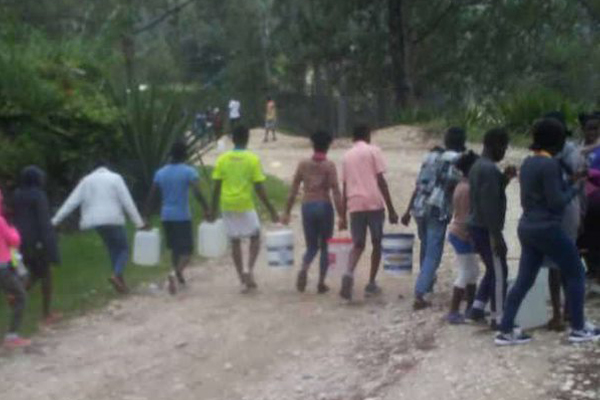 Reported by Kenson Kaas, NPH Haiti National Director of Childcare
Reported by Kenson Kaas, NPH Haiti National Director of Childcare
November 6, 2019 – Haiti
The team at Kenscoff is meeting 7 November in the morning to decide if the school can be reopened. Water trucks are charging close to double the usual price to deliver to Kenscoff. There are currently food supplies for one month in Tabarre and Kenscoff. Maintaining large stores of supplies would be possible if they had a depot. The next step is to refill the propane tanks. Many Hermanos Mayores continue to approach NPH for assistance. On calm days, the Don Bosco families can visit NPH in Tabarre to receive financial assistance of about US$20.
The primary needs are food, water, and security. In Kenscoff, there is enough food but the diet is basic—just rice and beans, no meat and no fish—with only a week’s worth of food left.
At Kenscoff, these days the children must walk three miles each way carrying large gallon jugs and other containers full of water back to the home. Every morning they trek to a local water source near Kenscoff, where they must jostle with local residents who also fetch water from this same source. Roundtrip they travel about 6 miles, or 9.7 kilometers, each day carrying as much water as they can. Because NPH Haiti is now sourcing water outside the home, they are running short of pills to treat the water.
Outside the home, protesters continue to call for President Moïse to step down, and he continues to resist this demand. Though the protesters riot, no leader is waiting or ready to step in should President Moïse decide to leave. Because of this, people fear a civil war may break out if the president leaves with no clear person or plan to succeed him.
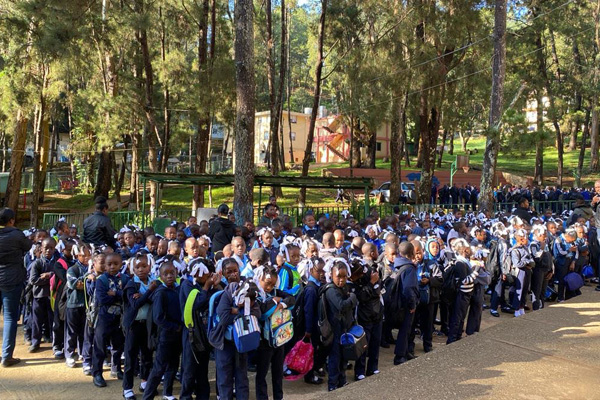 Reported by Kenson Kaas, NPH Haiti National Director of Childcare
Reported by Kenson Kaas, NPH Haiti National Director of Childcare
November 13, 2019 – Haiti
The team at Kenscoff met on November 7 to decide if the school could be reopened. The team decided “Yes” and the children at Kenscoff have returned to school. The depot is still under construction. A new propane tank was delivered to Kenscoff.
Updates will be posted here when available.
Related Information:
• Pschology Today Blog Post: “Fr. Rick Frechette: Fake News Has Real Consequences in Haiti”
• Crisis Alert: Political Unrest in Haiti – February 11 – 19, 2019
• NPH Haiti
• St. Damien Pediatric Hospital Fund
• How Your Help Makes an Impact at NPH







